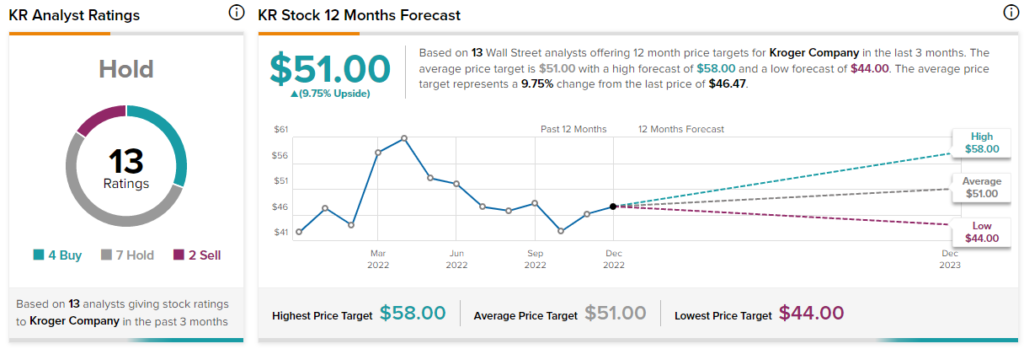Investors looking for recession-resistant stocks may need to look no further than grocery stores, especially as inflation raises prices and boosts revenues. However, not all grocery chains are created equal. In this piece, we compared two grocery stocks.
Pick the best stocks and maximize your portfolio:
- Discover top-rated stocks from highly ranked analysts with Analyst Top Stocks!
- Easily identify outperforming stocks and invest smarter with Top Smart Score Stocks
Kroger (NYSE:KR) owns a long list of grocery store chains, some of which may compete in the same markets as Sprouts Farmers Market (NASDAQ:SFM). However, they target different ends of the grocery market, with Sprouts focusing on fresh meat and produce, especially organic, grass-fed, and free-range options, while Kroger’s brands take a more generalized approach. They’re also taking different approaches to driving growth.
Kroger (KR)
Kroger owns grocery store chains in many parts of the U.S. The company is enjoying robust same-store sales growth, offers a solid dividend yield of 2.2%, has a healthy balance sheet, and has increased its guidance recently. Additionally, Kroger’s P/E multiple of around 14.8x is back to around where it was before the pandemic, despite its higher sales and steady growth. For these reasons, a bullish view seems appropriate.
Kroger shares are up about 100% over the last five years, with most of that coming during the pandemic. However, the supermarket operator’s P/E surged briefly before falling back to pre-pandemic levels despite its more recent growth.
Of particular interest is Kroger’s same-store sales growth, which clocked in at around 6.9%, excluding fuel, in the third quarter. The consensus had predicted 4% growth. In March, Kroger guided for identical sales, excluding fuel, to rise 2% to 3% this year and adjusted net earnings per share to come in between $3.75 and $3.86 per share. However, with its third-quarter earnings report, it raised its earnings guidance to a new range of $4.05 to $4.15.
Kroger is currently attempting to acquire competitor Albertsons (NYSE:ACI), although that deal is up in the air, as regulators may block it. Aside from possibly acquiring Albertsons, same-store sales growth is driving the company’s growth engine, as it has closed quite a few stores since last year. Kroger’s store count fell from 2,726 at the end of the third quarter of 2021 to 2,720 at the end of this year’s third quarter.
What is the Price Target for KR Stock?
Kroger has a Moderate Buy consensus rating based on five Buys, eight Holds, and one Sell rating assigned over the last three months. At $51.00, the average price target for Kroger implies upside potential of 9.75%.

Sprouts Farmers Market (SFM)
While Kroger is growing its same-store sales, Sprouts is focused on adding more stores, with plans to open 30+ stores in 2023. Sprouts has also been able to maintain its solid profit margin despite inflation. However, the company’s same-store sales leave much to be desired, coming in at 2.4% for the third quarter. Thus, Sprouts sits in a precarious position, calling for a wait-and-see approach and a neutral view for the near term.
On the company’s third-quarter earnings call, management told analysts that shoppers bought one fewer item on average as they coped with inflation, but they gravitated toward higher-margin items. In fact, Sprouts’ higher-priced categories are seeing the largest growth.
Additionally, the grocer’s e-commerce sales rose an impressive 19% year-over-year in the third quarter. These trends and the increased guidance in the third-quarter earnings report are all extremely positive, but Sprouts Farmers Market sits at a crossroads. Either it will thrive due to customers’ preference for higher-margin items, or it will begin to struggle.
At 15.2 times, the grocer’s P/E ratio is now in line with Kroger’s, despite its weaker same-store sales trends. Although Sprouts’ P/E is down significantly since before the pandemic, it was probably a bit overvalued then due to excitement around its initial public offering in 2018.
What is the Price Target for SFM Stock?
Sprouts Farmers Market has a Hold consensus rating based on one Buy, five Holds, and two Sells assigned over the last three months. At $33.38, the average price target for Sprouts Farmers Market implies downside potential of 1.1%.

Conclusion: Bullish on KR, Neutral on SFM
Kroger and Sprouts Farmers Market both have growth plans, but they’re using different approaches. Kroger is increasing same-store sales, while Sprouts is adding quite a few more stores. While there is much to like about Sprouts, the critical metric is same-store sales.
It’s too early to predict how Sprouts will hold up during this persistent inflation. The grocer increased its same-store sales in the third quarter, but we can’t know if that metric will continue rising. Sprouts could eventually outperform Kroger due to its customers’ preference for high-margin items, but for now, it’s best to wait and see.



















